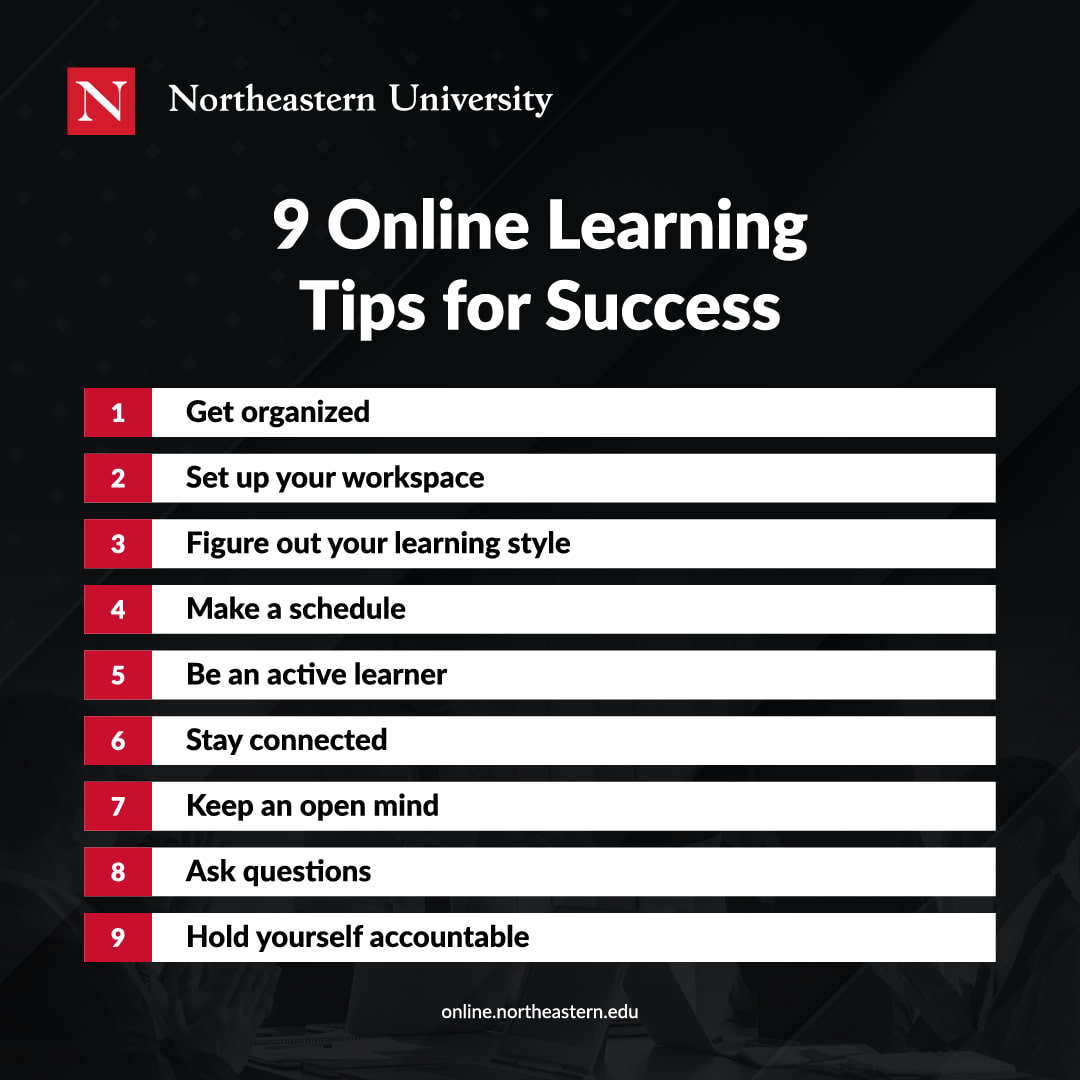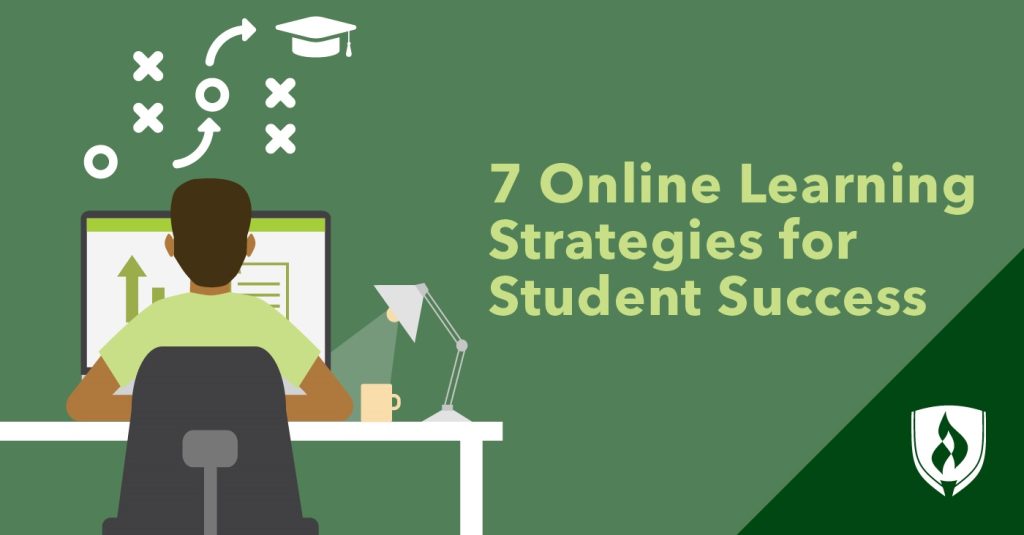Online learning is becoming more popular every day. Students and professionals alike are flocking to digital platforms.
But how can one succeed in this new environment? Online learning offers flexibility and convenience. Yet, it also comes with challenges, like staying motivated and managing time. To excel, you need effective strategies. This blog post will explore key online learning strategies.
These tips will help you stay organized, focused, and productive. Whether you’re a student or a working professional, these strategies can make a difference. Get ready to boost your online learning experience. Let’s dive in!

Credit: bachelors-completion.northeastern.edu
Setting Clear Goals
Setting clear goals is essential for successful online learning. With specific objectives, students can stay motivated and focused. Clear goals provide direction and a sense of purpose. This section discusses effective strategies for setting clear goals.
Defining Objectives
Start by defining your objectives. Ask yourself what you want to achieve. Do you want to improve your skills in a particular subject? Or perhaps earn a certification? Write these objectives down. Be specific and realistic. For example:
- Learn the basics of web development.
- Complete a course on digital marketing.
- Improve your writing skills.
Specific objectives help you stay focused. They give you a clear target to aim for. This makes it easier to track your progress.
Tracking Progress
Tracking your progress is equally important. It helps you stay on track and make adjustments if needed. Use tools like:
- Progress trackers: Many online learning platforms offer these.
- Spreadsheets: Create a simple spreadsheet to track your tasks and achievements.
- Calendars: Schedule your study sessions and deadlines.
Review your progress regularly. This will help you identify areas where you need to improve. Celebrate your achievements to stay motivated.
Here is a simple table to help you track your progress:
| Objective | Start Date | End Date | Status |
|---|---|---|---|
| Complete web development course | 01/01/2024 | 31/03/2024 | In Progress |
| Write a blog post weekly | 01/02/2024 | 31/12/2024 | In Progress |
Remember, setting clear goals is the foundation of successful online learning. Define your objectives and track your progress. Stay focused and motivated to achieve your learning goals.
Creating A Study Schedule
Online learning requires discipline and good time management. Creating a study schedule can help you stay on track. It ensures you dedicate time for each subject. Let’s explore some strategies to create an effective study schedule.
Time Management Tips
Time management is crucial for online learning. Here are some tips to help you manage your time effectively:
- Set specific goals: Define what you want to achieve each day.
- Prioritize tasks: Focus on the most important tasks first.
- Use a timer: Work in short bursts, like 25 minutes, then take a break.
- Avoid multitasking: Concentrate on one task at a time for better results.
- Create a daily plan: Write down your tasks for the day each morning.
Balancing Responsibilities
Balancing responsibilities is key to success in online learning. Many students have other commitments, such as work or family. Here’s how to balance them:
| Responsibility | Strategy |
|---|---|
| Work | Set aside specific hours for study and work. |
| Family | Communicate your study schedule with family members. |
| Self-care | Include time for relaxation and hobbies in your schedule. |
Remember to be flexible. Adjust your schedule as needed. Online learning gives you the freedom to learn at your own pace. Use this to your advantage.
Designing A Productive Workspace
Creating a productive workspace is key for effective online learning. A well-organized space can boost focus and motivation. Let’s explore how to design your workspace for success.
Minimizing Distractions
Distractions can hinder your learning process. Here are some tips to minimize them:
- Keep your workspace tidy. Clutter can be distracting.
- Use noise-canceling headphones. They block out background noise.
- Set specific study hours. Inform your household to avoid interruptions.
- Turn off notifications on your devices. This reduces temptation to check them.
Ergonomic Setup
An ergonomic setup prevents discomfort and injury. Here are some elements to consider:
| Element | Recommendation |
|---|---|
| Chair | Choose a chair with proper lumbar support. It should be adjustable. |
| Desk | Ensure your desk is at elbow height. Your wrists should be straight. |
| Monitor | Place your monitor at eye level. This prevents neck strain. |
| Keyboard and Mouse | Keep them within easy reach. Your arms should be relaxed. |
Paying attention to these details can make a big difference. A comfortable setup helps you stay focused and productive.
Utilizing Effective Study Techniques
Online learning has become a staple in modern education. Utilizing effective study techniques is crucial to maximize your learning potential. By adopting proven strategies, you can enhance your comprehension and retention. Let’s explore some of the best methods to improve your study habits.
Active Learning Methods
Active learning keeps your mind engaged and improves retention. Instead of passively reading, involve yourself in the material.
- Ask Questions: Always question what you read. This promotes critical thinking.
- Practice Teaching: Explain concepts to someone else. This reinforces your understanding.
- Interactive Quizzes: Use online quizzes to test your knowledge. They provide instant feedback.
Engagement is key to active learning. The more you interact, the better you learn.
Note-taking Strategies
Effective note-taking helps you retain and understand information. Here are some proven techniques:
- Cornell Method: Divide your page into sections. Notes, cues, and summaries.
- Mind Mapping: Use diagrams to link concepts. Visual aids enhance memory.
- Outline Method: Organize notes hierarchically. This shows relationships between topics.
Choose a method that suits your learning style. Consistency in note-taking boosts learning efficiency.
Time Management
Managing your time effectively is crucial for online learning. Here are some tips:
| Tip | Description |
|---|---|
| Set Goals | Define clear, achievable goals for each study session. |
| Prioritize Tasks | Focus on the most important tasks first. |
| Take Breaks | Short breaks help maintain focus and prevent burnout. |
Effective time management ensures you stay on track and meet your learning objectives.
Leveraging Technology
Online learning has become a vital part of education. Leveraging technology can make the learning process more efficient and enjoyable. With the right tools, you can enhance your learning experience significantly.
Useful Apps And Tools
Many apps and tools can improve online learning. Here’s a list of some of the most useful ones:
- Khan Academy: Offers free courses on various subjects.
- Duolingo: A great app for learning new languages.
- Evernote: Helps you organize your notes and tasks.
- Google Classroom: Perfect for managing classes and assignments.
- Quizlet: Useful for creating flashcards and study sets.
Online Resources
Using online resources can provide additional support. Some of the best resources include:
| Resource | Description |
|---|---|
| Coursera | Offers courses from top universities and companies. |
| edX | Provides free online courses from leading institutions. |
| TED-Ed | Short educational videos on a variety of topics. |
| BBC Learning | Offers resources for different subjects and age groups. |
| Codeacademy | Interactive coding lessons for various programming languages. |
With these apps and online resources, you can make your online learning experience more productive and enjoyable. Technology provides many tools to help you stay organized, engaged, and motivated.

Credit: www.researchgate.net
Maintaining Motivation
Maintaining motivation can be challenging in online learning. It’s easy to lose focus without a classroom environment. But, there are strategies to keep your motivation high and stay on track.
Setting Rewards
One effective way to stay motivated is by setting rewards. These rewards can be small treats or larger incentives. Use a reward system to celebrate your achievements.
Consider creating a table to track your progress and rewards:
| Task Completed | Reward |
|---|---|
| Finish a Module | Watch a Movie |
| Pass a Quiz | Have a Snack |
| Complete an Assignment | Buy a Book |
Setting rewards gives you something to look forward to. This can keep you motivated and make learning more enjoyable.
Finding Inspiration
Finding inspiration is another key strategy. Surround yourself with positive influences and content related to your studies.
Try these ideas:
- Read success stories in your field.
- Follow experts on social media.
- Watch motivational videos.
- Join online study groups.
Inspirational content can remind you of your goals. It can reignite your passion for learning. Keep these sources accessible to boost your motivation whenever needed.
Engaging With Instructors And Peers
Engaging with instructors and peers is a key part of online learning. It helps you understand the material better. It also makes your learning experience more enjoyable. Let’s look at two important ways to engage: participating in discussions and seeking feedback.
Participating In Discussions
Discussions are a great way to engage with the course content. They help you think deeply about what you are learning. Here are some tips for participating in discussions:
- Post regularly: Share your thoughts and questions often. This keeps you involved.
- Be respectful: Respect others’ opinions. This creates a positive learning environment.
- Ask questions: Asking questions shows you are interested. It also helps you understand better.
- Respond to others: Reply to your peers’ posts. This keeps the discussion going.
Seeking Feedback
Feedback is important for improving your skills. It helps you know what you are doing well and what needs work. Here’s how you can seek feedback effectively:
- Ask for specific feedback: Be clear about what you need help with.
- Use feedback to improve: Apply the feedback to your work. This shows you are learning.
- Thank your instructor: Show gratitude for their time. It encourages them to help you more.
Engaging with instructors and peers makes online learning more effective. By participating in discussions and seeking feedback, you can improve your learning experience.

Credit: otter.ai
Balancing Self-care
Online learning can be demanding. Balancing self-care is crucial for success. It helps maintain mental and physical health. This section explores ways to manage stress and develop healthy habits.
Managing Stress
Stress can hinder online learning. Managing it is important. Here are a few tips:
- Take regular breaks.
- Practice deep breathing exercises.
- Engage in hobbies.
- Stay organized with a schedule.
Try these techniques to reduce stress. A clear mind enhances learning.
Healthy Habits
Healthy habits support learning. They keep your body and mind strong. Consider these habits:
- Eat balanced meals.
- Stay hydrated.
- Exercise regularly.
- Get enough sleep.
Incorporate these habits into your daily routine. They improve focus and energy levels.
| Habit | Benefit |
|---|---|
| Balanced Meals | Boosts brain function |
| Hydration | Prevents fatigue |
| Exercise | Reduces stress |
| Sleep | Improves memory |
Balancing self-care ensures a productive online learning experience. Implement these strategies for better results.
Frequently Asked Questions
What Are Effective Online Learning Strategies?
Effective strategies include setting a routine, minimizing distractions, taking regular breaks, and using interactive tools.
How Can I Stay Motivated While Learning Online?
Set clear goals, reward yourself for achievements, and connect with peers for support.
What Tools Can Help With Online Learning?
Popular tools include Zoom, Google Classroom, Quizlet, and Evernote for note-taking and collaboration.
How To Manage Time Effectively For Online Studies?
Create a schedule, prioritize tasks, and use tools like calendars or apps to stay organized.
What Is The Best Way To Take Notes Online?
Use digital note-taking apps like OneNote or Evernote. Keep notes clear and organized.
How To Avoid Distractions During Online Classes?
Find a quiet space, turn off notifications, and use noise-canceling headphones if needed.
How Can I Improve My Online Learning Skills?
Practice active learning, ask questions, participate in discussions, and review materials regularly.
Conclusion
Successful online learning requires effective strategies. Establish a routine. Manage your time wisely. Stay organized. Set realistic goals. Take regular breaks. Engage with your peers. Seek help when needed. Practice self-discipline. Use available resources. Stay motivated. Implementing these strategies can enhance your online learning experience.
Embrace the flexibility and opportunities it offers. Keep learning and growing.



